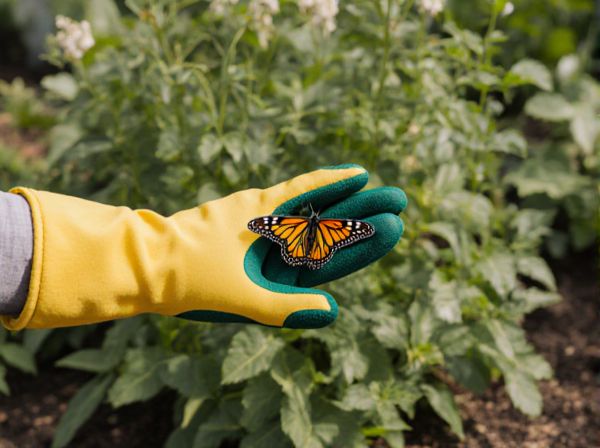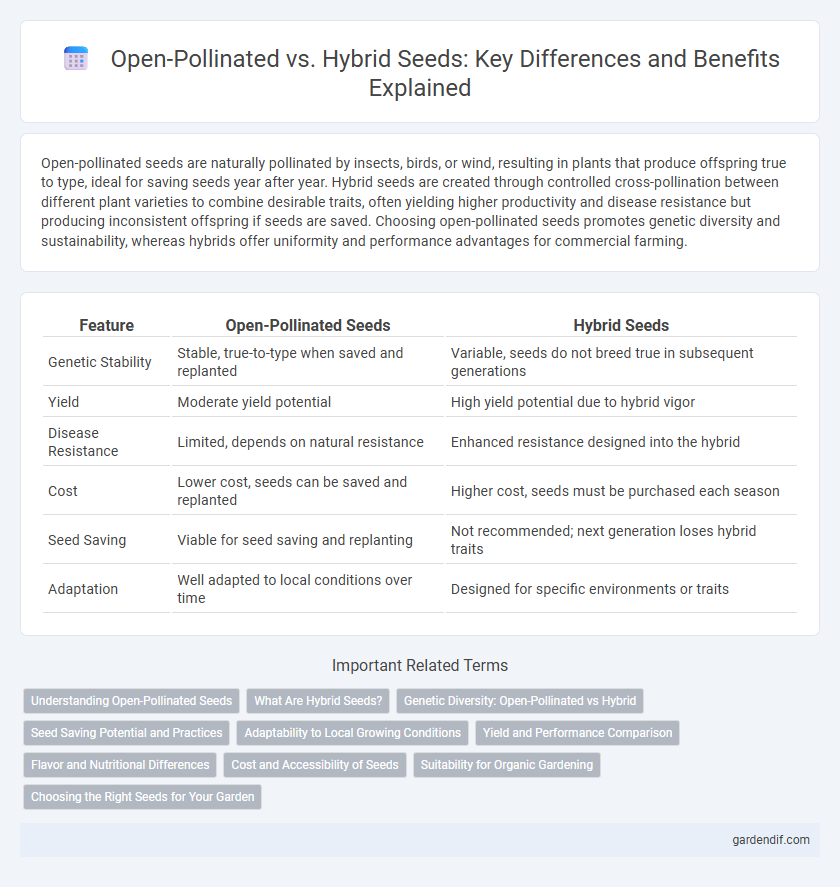
Open-pollinated vs Hybrid Illustration
Open-pollinated seeds are naturally pollinated by insects, birds, or wind, resulting in plants that produce offspring true to type, ideal for saving seeds year after year. Hybrid seeds are created through controlled cross-pollination between different plant varieties to combine desirable traits, often yielding higher productivity and disease resistance but producing inconsistent offspring if seeds are saved. Choosing open-pollinated seeds promotes genetic diversity and sustainability, whereas hybrids offer uniformity and performance advantages for commercial farming.
Table of Comparison
| Feature | Open-Pollinated Seeds | Hybrid Seeds |
|---|---|---|
| Genetic Stability | Stable, true-to-type when saved and replanted | Variable, seeds do not breed true in subsequent generations |
| Yield | Moderate yield potential | High yield potential due to hybrid vigor |
| Disease Resistance | Limited, depends on natural resistance | Enhanced resistance designed into the hybrid |
| Cost | Lower cost, seeds can be saved and replanted | Higher cost, seeds must be purchased each season |
| Seed Saving | Viable for seed saving and replanting | Not recommended; next generation loses hybrid traits |
| Adaptation | Well adapted to local conditions over time | Designed for specific environments or traits |
Understanding Open-Pollinated Seeds
Open-pollinated seeds result from natural pollination processes, preserving genetic diversity and allowing gardeners to save seeds with predictable traits for future planting. These seeds maintain true-to-type characteristics from one generation to the next, making them ideal for sustainable farming and heirloom crop preservation. Unlike hybrids, open-pollinated seeds offer resilience and adaptability in various growing conditions without the need for repeated seed purchases.
What Are Hybrid Seeds?
Hybrid seeds result from the deliberate crossbreeding of two genetically distinct parent plants to produce offspring with specific desired traits such as increased yield, disease resistance, and uniformity. These seeds do not breed true, meaning their subsequent generations often exhibit varied characteristics, unlike open-pollinated seeds which maintain consistent traits across generations. Hybrid seeds are widely used in commercial agriculture to maximize productivity and crop performance under diverse environmental conditions.
Genetic Diversity: Open-Pollinated vs Hybrid
Open-pollinated seeds promote genetic diversity by allowing natural cross-pollination among plants, resulting in varied offspring with traits adapted to local conditions. Hybrid seeds are created through controlled crosses between specific parent plants, producing uniform, high-yielding crops but with reduced genetic variation. Maintaining genetic diversity through open-pollinated seeds supports ecosystem resilience and long-term agricultural sustainability.
Seed Saving Potential and Practices
Open-pollinated seeds allow gardeners to save and replant seeds with consistent traits year after year, ensuring genetic stability and cost savings. Hybrid seeds typically produce vigorous plants but often do not breed true in subsequent generations, making seed saving unreliable and less effective. For seed saving practices, open-pollinated varieties require isolation of plants to prevent cross-pollination, while hybrids are generally purchased fresh annually due to genetic variability in saved seeds.
Adaptability to Local Growing Conditions
Open-pollinated seeds often exhibit greater adaptability to local growing conditions because they develop naturally within a specific environment, allowing plants to evolve traits suited to regional climate, soil, and pests. Hybrid seeds, created by crossing genetically distinct parents, can offer uniformity and enhanced vigor but may lack the genetic diversity to thrive in varied or challenging local conditions without additional inputs. Farmers aiming for resilience and seed saving practices typically prefer open-pollinated varieties to better match their unique environmental factors.
Yield and Performance Comparison
Open-pollinated seeds offer consistent yields with stable performance across generations, making them ideal for sustainable farming practices. Hybrid seeds typically provide higher initial yields and enhanced resistance to pests and diseases due to controlled crossbreeding techniques. However, hybrid performance can decline in subsequent generations if seeds are saved, unlike open-pollinated varieties that maintain yield reliability when replanted.
Flavor and Nutritional Differences
Open-pollinated seeds produce plants with stable, consistently flavorful fruits that retain a rich nutrient profile due to natural pollination methods. Hybrid seeds often yield higher crop productivity but may compromise some flavor complexity and nutritional depth because they are bred primarily for uniformity and disease resistance. Choosing open-pollinated varieties supports biodiversity and preserves taste integrity, while hybrids cater more to commercial-scale farming and yield optimization.
Cost and Accessibility of Seeds
Open-pollinated seeds are generally more affordable and accessible, as they can be saved and replanted year after year without loss of genetic traits. Hybrid seeds tend to be more expensive due to proprietary breeding and the need to purchase new seeds each season to maintain desired characteristics. Farmers seeking cost-effective and sustainable options often prefer open-pollinated seeds for their budget-friendly nature and seed-saving potential.
Suitability for Organic Gardening
Open-pollinated seeds are highly suitable for organic gardening due to their natural genetic diversity and ability to produce stable, true-to-type offspring without synthetic inputs. Hybrid seeds, while often offering higher yields and disease resistance, may not consistently reproduce desirable traits in subsequent generations, making them less ideal for organic seed saving. Organic gardeners prefer open-pollinated varieties to maintain biodiversity and adapt crops to local growing conditions naturally.
Choosing the Right Seeds for Your Garden
Open-pollinated seeds produce plants that breed true to type, ensuring consistent traits and allowing gardeners to save seeds for future planting. Hybrid seeds result from cross-pollination between different varieties, offering higher yields and disease resistance but often do not produce viable seeds. Choosing between open-pollinated and hybrid seeds depends on your goals for garden sustainability, seed saving, and crop performance.
Open-pollinated vs Hybrid Infographic

 gardendif.com
gardendif.com